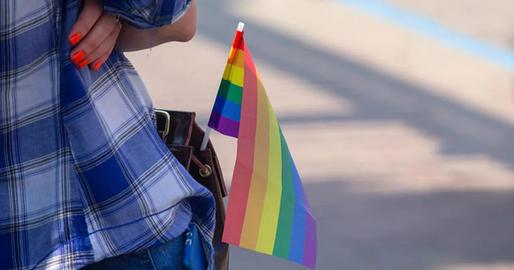For more than 30 years now, since its inception in California in 1990, April 25 to March 1 has been designated Lesbian Visibility Week: an international celebration and much-needed foregrounding of women who love women. Like other members of the LGBT+ community, gay women often experience erasure from public life and conversations that ought to be shared, and this week is a chance for them to re-stake their claim and highlight the issues that matter to them.
More recently there has been a nascent awareness in both East and West that included under this banner there might be some trans women, born biologically male but who consider themselves female, who are attracted to other female or female-presenting people.
In Iran, being homosexual is a capital offense but it naturally continues to exist under the radar; a recent survey by Iran Open Data found four percent of female respondents had covertly solicited sex, and were more likely to be seeking a homosexual partner than the men. Being trans in Iran is sometimes legally permissible, subject to a morass of out-of-date obligations and restrictions.
In all cases, both biologically female and trans lesbians in Iran find their lives blighted by patriarchy, descrimination and basic, widespread ignorance. This week belongs to all of them. To mark the occasion we talked to Elham, a gay trans woman who was born a boy named Mohammad, who loved women all her life but only in the last two years realized what was missing. To this day, her wife has stayed by her side.
***
"I was 26 when I married a girl, my girlfriend. She was six years older than me. In our society, it's not very common for a man to marry an older woman. The choices I make are often seen as a little unreasonable. We loved each other very much but nothing seemed to be right. I felt terrible regret, for which I didn't know the reason."
Three years into her marriage, Elham - then Mohammad - and her partner decided they ought have children. "It was very difficult, almost intolerable for me. I didn't know what to do. In the eyes of others, I was a boy who'd married a girl, and I felt my own emotional and sexual attraction to girls. Everything seemed settled, but something inside me was falling apart."
Before she got married , Elham said, she'd had a relationship with a boy to "test herself". It wasn't succesful and wasn't what she wanted either. In her young mind, she could be one of two things: homosexual or heterosexual. It would take years in a disquieted marriage for the penny to drop.
"Gradually, I came to have problems with sex. My wife figured it out very quickly, but we loved each other so much we thought it didn't matter. But it did. My mood was getting worse day by day; then we were both depressed. Corona and quarantine made it worse. Against my wife's wishes, I put off having children.
"One night, when I was in a strange mood, we talked. I told my wife, 'I feel I haven't been honest with you, that I've lied to you. I might leave you one day. I don't know why; I just know this isn't my reality.'"
Time passed, and Elham remained curious. Through online research and conversations with others, she - then still a he - slowly became acquainted with the existence of trans people and gender dysphoria. Elham realized that like untold thousands, possibly millions of others the world over, she was born into a male body but had always identified as female. The missing piece finally had a form.
"I told my wife, 'I have two pieces of news for you. The first is that I've realized I am not a gay man and I have no sexual orientation toward men. The second is that I think I'm a trans and my real gender is female.' My wife's attitude was very good and pragmatic, and I felt I'd solved a huge riddle. I considered myself a woman, but on the other hand, my emotional and sexual orientation was also toward other women. So... I could be a lesbian. Everything was in place now and I could understand what was going on inside me."
Despite the elation the pair felt, Elham's problems were only just beginning. In Iran, trans people are regarded with suspicion if not outright hostility by large swathes of the community. And unlike in other countries, being recognized as a trans woman is contingent on undergoing invasive surgery by court order, which a trans person may or may not feel they need. By revealing her true gender identity, Elham was instantly exposed to this double onslaught: societal and legal.
Her own immediate family reacted horribly, she says, so much so that she had to cut herself off from them. The only person who stayed by her side was her wife; the woman she had married for love and still loved. "I wanted to experience [being female]; my wife's clothes were my size and I felt good wearing them.
"Hormone therapy was a very important point in my journey. It was as if my body had always been deficient in these hormones. I could be more realistic on them; I'd cry, laugh, dance and enjoy life. But starting hormone therapy was no an easy task. I didn't have the necessary permits from the court. The doctor wouldn't prescribe it for me, nor would the pharmacy." Eventually, they found a doctor willing to take the risk of prescribing Elham's hormones off the books.
Though they were happy together, nothing about the journey was easy: from Elham's first appearance out in the community in new clothes, to the physical changes to her body brought about by medication, to the inevitable job loss and exclusion from family and old friendship groups.
But her biggest concern was and remains the couple's life together. They love and understand each other, she says, but this life was not the one they had planned. "I've changed, but these changes may not have been my wife's choice in life," she says. "She chose Mohammad for life, but now I'm Elham. I give her the right to not want this life, and to want to go and live with a man, or to become a mother."
No matter what happens to their relationship, Elham says, "My ultimate goal now is to get out of Iran. I think in a freer place, we'll have better opportunities and the space to make decisions, to test ourselves, and see what we want out of life. I could be a more successful person using my talents and expertise at work, without judgment of my sexual and gender identity."
The last obstacle for them now is the problem of Elham's military service: an obligation she is still being expected to fulfil, despite everthing, due to not having yet had gender reassignment surgery. "I don't want to get surgery in Iran," she says. "The risks are too high and I'm too afraid. I'm stuck in the mud, and once again I don't know what to do."
visit the accountability section
In this section of Iran Wire, you can contact the officials and launch your campaign for various problems

























comments